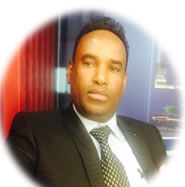 by Abdirizak Adam Gedi
by Abdirizak Adam Gedi
Sunday, February 21, 2021
This article will focus on a brief of history of the nation, which has suffered from poor economic performance, negative economic growth, government collapse, tribal war and droughts, dependence on foreign aid and endless frustration by failed efforts at reconciliation.
Since the end of the Cold War, state failure has become one of the greatest political problems facing the word today. Failed states are difficult to classify and this has attracted much attention in academic and political circles, as many studies and debates have underlined the problem of state weakness, ruin and collapse.
Somalia is one of the world’s failed states, and several factors contributed to its fall, including tribalism, disagreement over the nature of the state, and international aid.The other main factor, which led to the failure of the Somali state, were the divide-and-rule policies laid down by military regime, which encouraged deep inter-clan hostilities and mistrust.
advertisements
These are also held partly responsible for the failure of the clans to join together and form a post-Barre government. Somalia has seen continued armed conflict since its withdrawal from the Ethiopian warin 1977.The collapse of Somalia in the post-Cold War era and the concurrent humanitarian disasters brought new problems for diplomatic and military operations in the country. The strategic western circle in the country had almost been forgotten after the ill-fated attempt of the United Nations to maintain mediation during the early conflicts.After the UN and USA humanitarian missions in 1993-1995 had failed to restore peace, they were forced to withdraw. Subsequently, Somali warfare and hostility continued but with less intensity.
The international community turned a blind eye to the Somali people, and the nation fell into the hands of rival clan-based warlords who took control of the capital city and many parts of the country, and were responsible for turning Somalia into the most fragile and potentially unstable state in the whole world.
Somalia is a victim of the past and is suffering many angels such us political, social, military and economic from interference of regional states and international communities, the reason I am saying this is there is no doubt that the international community they never forget the violence against them during the humanitarian intervention after the Somali state collapsed.
The departure of UN and US peacekeeping troops marked the end of the post-intervention period in Somalia, and this represented a turning point, as the country then became widely regarded as a prime example of a failed state, existing without any reliable form of government.
When the Somali state failed it would have required constructive cooperation among its politicians in order to rebuild the country and ensure that it did not become a security threat to its neighbours and the international community.
A large number of Somali intellectuals, scholars, and former politicians were concerned about the country’s status quo and the gap left by the departure of UN peacekeeping forces. Between 1995 and 2000 they attempted to reinstate the Somali national institutions and to redefine the nation’s sovereignty.
They volunteered for positions themselves as they tried to rebuild the internal structureof an operative state, and to save their struggling nation.Since Somalia departure from the transitional period, in 2012 which was a historic year for the country after forty years of presidential elections,this was a sign that security of the country was improving.
However, not much has been learned yet about the various challenges that have impeded the country's democratic transformation in recent years, though, the international community is focusing on how Somalia would have a recognized government, but unfortunately, the last two terms of a recognized government the successive administrations of the country has no credible, experienced leaders to govern the nation or build functioning institutions and they confused about how to lay the foundations for good governance, the reason was to not understand the root causes of the conflict which were not properly addressed, and this was the responsibility of both the Somali groups and the ineffective international mediators, as well as widespread corruption and the political turmoil that the country has experienced.
This nation is seeking a true friendship country that helps to reconstitute a governmental system and put on a political pressure a seceded region and regional states, as many African failed states had a friend who stand by a side such us Sierra Leone who get a help UK government to end it’s civil war and the country has restored democratic governance, peace and stability.
Abdirizak Adam Gedi MA, BA Former National Strategic Communications Consultant OPMState Minister Minister of Planning, Investment & International CooperationOf Hir-Shabelle State of Somalia - Graduated University of Westminster International Relations Democratic & Politics[email protected]
Abdirizak Adam Gedi MA, BA Former National Strategic Communications Consultant OPMState Minister Minister of Planning, Investment & International CooperationOf Hir-Shabelle State of Somalia - Graduated University of Westminster International Relations Democratic & Politics[email protected]